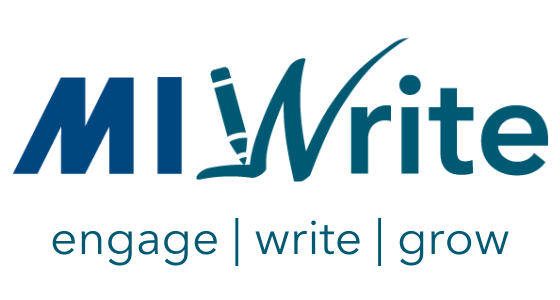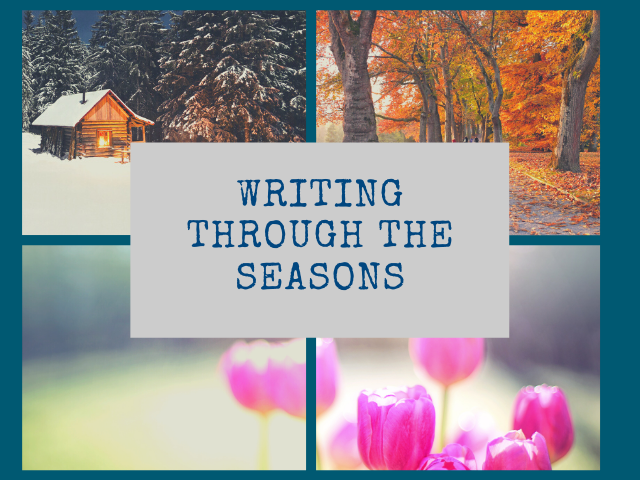
Writing isn’t always given the time and attention it deserves. We know that your schedule may not have much wiggle room, especially in these odd days of the pandemic and blended learning models of schooling. However, we do hope that you will be able to squeeze in writing instruction when you can. To help you do that, here are some suggestions* for how and when to include writing in your lesson.
September – use MI Write to get to know your students and figure out what their writing needs are.
- Prompts: Create a prompt asking your students to introduce themselves, highlighting their favorite thing to do, their goals in life, and where they struggle the most in school.
Pro tip: Don’t “grade” this assignment for content or even errors. Read it to get to know your students and then look at the structure of their writing – the grammar, organization, development of thoughts, etc. Use this first writing sample to assess what your students do well and where the gaps are. You can create peer review groups based on your findings.
October – Begin addressing the most common needs.
- Prompts to use: The Magic of Fall. – Modify this pre-packaged prompt to meet the needs of your students. You could make this a narrative or argumentative prompt if your students need practice in either of those genres.
Pro tip: Use the Trait and Total Scores report to see how your which traits your students are mastering and with which they are struggling the most. If you find your students are consistently scoring low in a particular trait, you can assign specific lessons within that category to help them improve that area. We also provide lessons for other grammar issues, such as choppy sentences, punctuation, and subject-verb agreement.
November – First benchmark** – opinion/argumentative writing
- Prompts to use:
- (grades 3-5) Should We Feed the Birds?
- (grades 6-8) Why Do We Need the Olympic Games?
- (grades 9-10) Was It Really Barbara Fritchie?
- (grades 11-12) Is College Really Worth It?
Pro tip: Allow your students to submit a draft or two of the essay and then begin holding one-on-one conferences with them to discuss their progress. Focus on the elements of opinion/argumentative writing in this session to strengthen their understanding of the genre. What are they doing well? Where do they need extra support? This is also when you can assign lessons to help them with specific skills. Don’t forget to give them time to ask questions!
December – Personal writing. Allow your students to be creative. See this post for fun winter writing activities for your classroom.
January – Second benchmark – informative/explanatory writing
- Prompts to use:
- (grades 3-5) Camels: Ships of the Desert
- (grades 6-8) An Older Crust
- (grades 9-12) The Biofuel Controversy
Pro tip: Enable peer review on your chosen prompt and give students time to read their peers’ essays and leave feedback. Select up to six genre- and grade-specific questions for students to focus on as they consider their classmates’ writing.
February – Personal writing. With testing quickly approaching, how are students feeling? What do they need?
- Prompts: Create a prompt asking students to share their thoughts about the end of the year. Are they where they thought they’d be? Are there topics that you’ve covered already that they are still unsure of? This is a chance to not only get students to be reflective but also to see how their writing has improved.
Pro tip: Take an opportunity to meet with your students one-on-one again. This time, you can show them their progress with writing as well as discuss any concerns you or they may have.
March – Third benchmark – narrative writing
- Prompts: Use the Student Choice Narrative or create your own prompt to allow students to write narratives that demonstrate whatever elements or skills you are looking for. Some examples are below:
- (grades 3-5) plot, setting, point of view
- (grades 6-8) sensory details, imagery, foreshadowing
- (grades 9-12) personal narratives, multiple plot lines, combining multiple genres
Pro tip: We have several lessons that are specifically useful in narrative writing. Go over a lesson as a whole class, use several in a small group setting, or assign individual lessons to students directly.
April – Explore writing during poetry month. Read, write, analyze poems, play with conventions, get creative! Weave poetry in with another genre. Check out this blog post for a free poetry lesson or use one of the pre-packaged prompts already in MI Write.
- Prompts to use:
- (grades 3-4) Things Just Didn’t Go the Way I Planned
- (grades 5-6) Analysis: “The Walrus and the Carpenter”
- (grades 7-8) Poem to Narrative: “The Highwayman”
- (grades 8-9) Poetry vs. Art – Which is More Descriptive?
- (grade 10) Poem to Narrative: “I’d Pick More Daisies”
- (grades 11-12) Good Fences/Good Neighbors
May – Reflection on the year – what went well, what was learned, what is left?
- Prompt: Create a prompt in which your students can think about their progress over the course of the year and share those thoughts with you.
Pro tip: Spend some time with each student and respond to their reflection. This could be less about their writing and more about the content. Praise them for their accomplishments, no matter how small they may be. Perhaps suggest some resources to help them with areas in which they are still struggling. Give them some control over what’s left to be learned.
For more ideas on how to write year-round, check out this blog post! If you don’t have MI Write yet and would like more information, visit us here.
*these are merely suggestions– feel free to use any prompt you’d like. Create your own or modify any pre-packaged prompt to fit your needs.
**the use of benchmark here is used to describe specific times that you would assess your students’ skills in the three main genres of writing.


